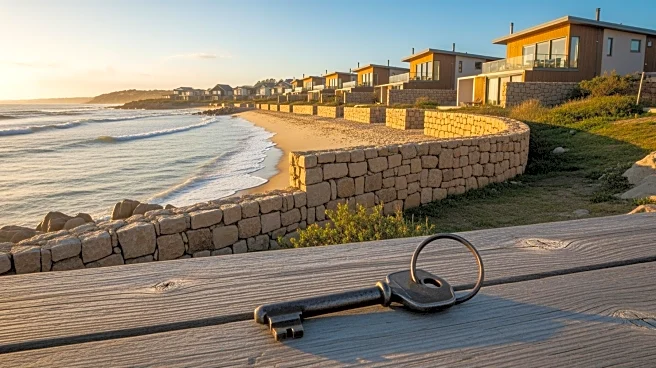What's Happening?
The Canary Islands have introduced a five-year moratorium on new holiday rental licenses in response to a growing housing shortage. This decision follows intense parliamentary debates and aims to regulate the surge in holiday rentals that have contributed
to the housing crisis. The new law reclassifies holiday rentals as a formal business, subjecting platforms like Airbnb and Booking.com to increased scrutiny. Existing properties with registered licenses are exempt, leading to a rush for permits. The freeze impacts areas like Maspalomas and Playa del Inglés, where acquiring new condos for short-term rentals is now prohibited. This regulatory change is expected to affect property values, with licensed apartments likely increasing in value due to scarcity, while unlicensed units may see a decrease in appeal.
Why It's Important?
The freeze on new holiday rentals in the Canary Islands is significant as it addresses the housing shortage exacerbated by the tourism boom. With over 10.3 million international visitors from January to August 2025, the islands have seen record tourist arrivals, contributing €15 billion to the economy. However, this influx has raised concerns about rising rents and the lack of affordable housing for locals. The new regulations aim to prioritize housing for residents over tourist accommodations, reflecting a broader European trend towards stricter rental controls. The impact on investors and property owners is substantial, as the inability to transfer licenses upon sale or inheritance could diminish resale values, turning investments into liabilities.
What's Next?
Municipalities in southern Gran Canaria are tasked with creating custom plans to regulate rental density and location, considering local factors such as beachfront regulations. The law limits tourist housing to 10% of the total habitable space per municipality, which is already strained in popular areas like Tenerife. The government plans to enforce registration of all rentals by mid-2026, with penalties for non-compliance. This legislation could lead to a shift towards long-term leases and potentially drive investors to relocate to less regulated areas. The Canary Islands face the challenge of balancing tourism growth with housing affordability for residents.
Beyond the Headlines
The freeze on new holiday rentals in the Canary Islands highlights the ethical and cultural dimensions of tourism management. The move reflects a growing concern among locals about 'tourism saturation' and its impact on community life. Protests in Tenerife earlier in the year underscored the tension between economic benefits from tourism and the social costs of rising rents and displacement. The legislation may also influence broader European policies on holiday rentals, as mainland Spain has already implemented similar measures requiring neighbor approval for new tourist rentals.

















